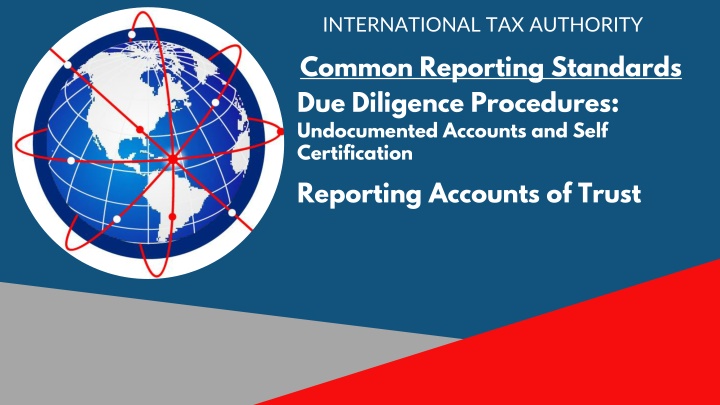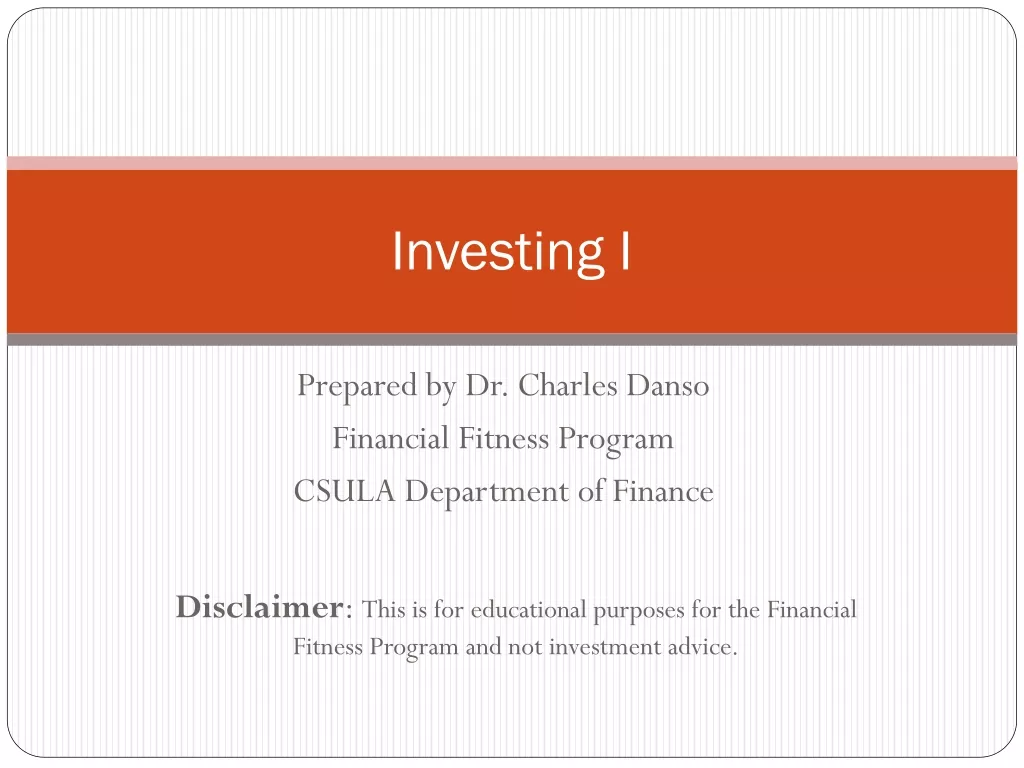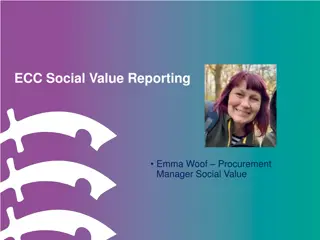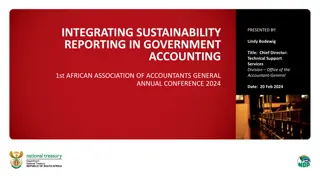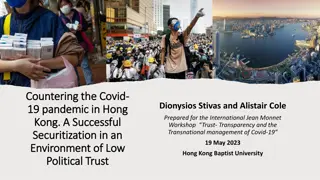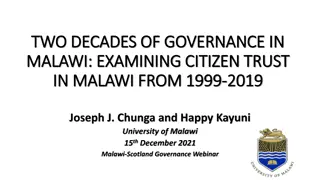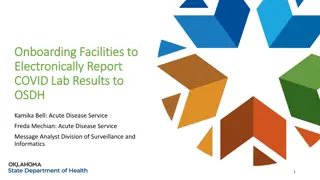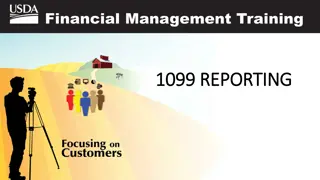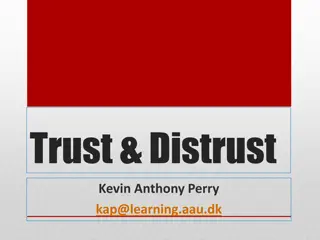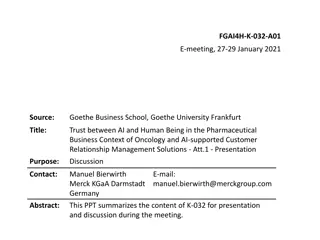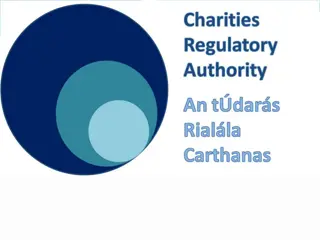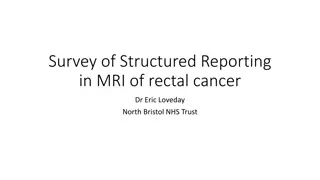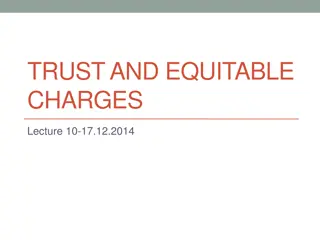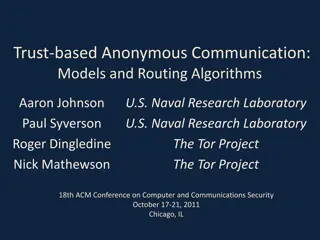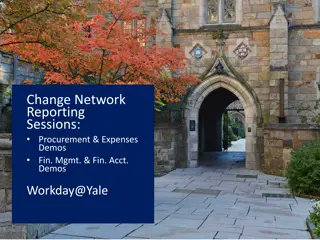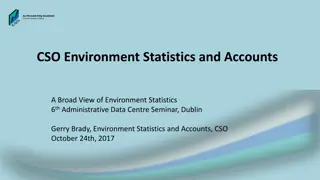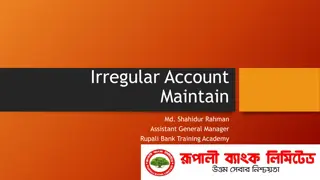Reporting Accounts of Trust
Explore the due diligence procedures for undocumented accounts and self-certification reporting in trust accounts as outlined by the INTERNATIONAL TAX AUTHORITY's CRS guidelines. Learn about the process when faced with undocumented accounts and the steps to follow for self-certification. Understand the responsibilities of Reporting Financial Institutions in establishing tax residency for account holders and the subsequent actions required based on account values.
Download Presentation

Please find below an Image/Link to download the presentation.
The content on the website is provided AS IS for your information and personal use only. It may not be sold, licensed, or shared on other websites without obtaining consent from the author.If you encounter any issues during the download, it is possible that the publisher has removed the file from their server.
You are allowed to download the files provided on this website for personal or commercial use, subject to the condition that they are used lawfully. All files are the property of their respective owners.
The content on the website is provided AS IS for your information and personal use only. It may not be sold, licensed, or shared on other websites without obtaining consent from the author.
E N D
Presentation Transcript
INTERNATIONAL TAX AUTHORITY Common Reporting Standards Due Diligence Procedures: Undocumented Accounts and Self Certification Reporting Accounts of Trust
INTERNATIONAL TAX AUTHORITY CRS Due Diligence Procedures Undocumented Accounts N.B. The Undocumented Account procedure only applies to Pre- existing Individual accounts. When will a Reporting Financial Institution apply the undocumented account procedure? Where the indicia search is completed, and the only indicia found is a hold mail or in-care-of address and no other address is identified for the account holder
INTERNATIONAL TAX AUTHORITY CRS Due Diligence Procedures Undocumented Accounts Cont d What is the Undocumented Account Procedure? In the order most appropriate to the circumstances, the financial institution can either complete a paper record search; obtain a self-certification from the account holder or Documentary evidence to establish the residence for tax purposes of the account holder. If none of these procedures establishes the account holder s residence for tax purposes, the Reporting Financial Institution must report the account as undocumented.
INTERNATIONAL TAX AUTHORITY CRS Due Diligence Procedures Undocumented Accounts Cont d What should be done after the account has been reported as undocumented? Lower Value Account: Not required to re-apply the undocumented account procedure in any subsequent year until there is a change in circumstances that results in further information on the tax residence of the account holder, or the account becomes a high value account. The account must be reported as an undocumented account until the account ceased to be undocumented. High Value Account: Annually apply enhanced review procedures of High Value Accounts until the account ceases to be undocumented
INTERNATIONAL TAX AUTHORITY CRS Due Diligence Procedures Self Certification Self Certification a certification that provides the account holder s status and any other information that may be reasonably requested by the Reporting Financial Institution to fulfil its reporting and due diligence obligations.
INTERNATIONAL TAX AUTHORITY CRS Due Diligence Procedures Self Certification Self-Certification is only required for: Preexisting Individual Account - When there is conflicting indicia; or when there is an hold mail or in-care- of address; or In case of High Value Account, the relationship manager does not have knowledge of the account holder residence for tax purposes. Preexisting Entity Account 1) if available information (AML/KYC Procedures) does not identify the tax resident of the account holder; and whether the entity is a Passive NFE; or 2) if the Passive NFE account balance or value exceeds USD 1, 000,000 New individual and entity Account upon opening the account; to determine whether the entity is a Passive NFE and whether the controlling persons are reportable persons
INTERNATIONAL TAX AUTHORITY CRS Due Diligence Procedures Self Certification Cont d Validity of Self-Certifications Name of Account holder Residence Address; Jurisdiction(s) of residence for tax purposes TIN with respect to each Reportable Jurisdiction Date of Birth Signed (or positively affirmed) by the account holder or by any person authorised to sign on behalf of the account holder. NB: Self Certification with respect to the Controlling Person is valid only if it is signed (or positively affirmed) by the Controlling Person or a person with authority to sign for the account holder or the Controlling Person
INTERNATIONAL TAX AUTHORITY CRS Due Diligence Procedures Self Certification Question 1: The discretionary beneficiary will not receive distributions until the parent/trustor pass away; the beneficiary is not from a reportable jurisdiction. a) Is the Controlling Person declaration still necessary for the minor child? b) Can we use other supporting documents for CRS Purposes? Answer: Assuming the Trustor is the Settlor and the Controlling Person declaration is the Self- Certification, then the account is held by the settlor. As the account holder, the Reporting FI should due diligence procedures on the settlor to determine if this person is reportable. Since the Settlor has not pass away, the Reporting FI should not be conducting due diligence procedures on the discretionary beneficiary at this time.
INTERNATIONAL TAX AUTHORITY CRS Due Diligence Procedures Self Certification Financial Institution being the Trust/Investment Entity Settlor (Trustor) or Beneficiary of all or a portion of the trust, or any natural person exercising ultimate effective control over the trust Financial Account (Debt or Equity Interest held in the Trust) Before Death of Trustor After Death of Trustor Account is held by the Trustor, discretionary Beneficiary not an account Holder under distribution Made Trustor no longer account holder due to death, discretionary beneficiary now account holder due to distribution made.
INTERNATIONAL TAX AUTHORITY CRS Due Diligence Procedures Self Certification Cont d Question 2: In lieu of the submission of controlling person declaration form of the discretionary beneficiary, the Trust undertakes to submit all the documents required when a distribution has been made to the discretionary minor beneficiary. Will the email undertaking of the trust sufficient documentation for CRS purposes not to report the discretionary beneficiary until a distribution has been made? Answer: until a distribution is made the account is not reportable on the level of the beneficiary. No documentation for beneficiary but documentation will be needed for the person who is the account holder Question 3:For a minor discretionary beneficiary with duly appointed legal guardians, can the controlling person declaration form be under the name of the legal guardian and not the of the beneficiary? Answer: A discretionary beneficiary will only be reviewed if they received distributions from the Trust. As such the Reporting FI should be focus on due diligence procedures for the current account holders, i.e. Trustee, Settlors. If distribution is made before coming of age, then Self-certification can be signed or affirmed by someone who has authority to do so on behalf of the account holder.
INTERNATIONAL TAX AUTHORITY CRS Due Diligence Procedures Self Certification Cont d Question 4: . The Trustor/parent doesn t want a child to know that he is a beneficiary in a revocable trust. The execution of the controlling person declaration form will violate the confidentiality of the trust agreement. What alternate documents can be executed to support the information of the controlling person discretionary beneficiary? Answer: the Trustor is equivalent the Settlor and the Controlling Person declaration is the Self- Certification, then the account is held by the settlor. As the account holder, due diligence procedures should be conducted in relation to the settlor to determine if this person is reportable. Self Certification/due diligence will not be required for the beneficiary since this person has not received any distribution for the reporting period.
INTERNATIONAL TAX AUTHORITY CRS Due Diligence Procedures Self Certification Cont d Question 5: What is the weight of the relationship manager s statement or declaration as substitute document for the self-certification form in case the accountholder is unable to complete and sign the form or as substitute document for the controlling person declaration form in case the controlling person is unable to execute and sign? Answer: The Relationship Manager statement is part of the due diligence procedures for a Preexisting Individual High Value Account. Therefore if the Relationship Manager has actual knowledge of the account holder s tax residence, Self- Certification will not be necessary. Question 6: Is there a validity period for the self-certification form? Answer: There is no validity period for a self certification form. However, if there is a change in circumstances of the account holder the Self-Certification is no longer valid. The self Certification is no longer valid if the Reporting Financial Institution has reason to know the information is unreliable
INTERNATIONAL TAX AUTHORITY CRS Due Diligence Procedures Self Certification Cont d Question 7: If the investor changed his/its address, is there a need to execute a new self-certification form if the tax residence remains the same? Answer: Yes. The Reporting Financial Institution cannot rely on the original self-certification since there is a change of circumstances. Question 8: The individual investor passed away and his estate is still in the process of settlement with the heirs. No advice yet on the successor of interest. Given the circumstances, should we continue to report the decedent as the reportable accountholder? Answer: If there is documentation (i.e. Will or Death Certificate) of the account holder s death, the account will be considered an excluded account. Until success of interest has been identified
INTERNATIONAL TAX AUTHORITY CRS Due Diligence Procedures RECAP Undocumented Accounts: Undocumented Account procedure only applies to Pre-Existing Individual accounts Occurs when the only address found is a holdmail or in-care-of address and no other address found Reporting FI must conduct certain procedures to rectify this issue After conducting these procedures and unable to establish the tax resident of the Account, then report as undocumented. Self-Certification: Self-Certification are required for new accounts but only required for preexisting accounts if the financial institution is unable to complete its reporting and due dilingence obligations
INTERNATIONAL TAX AUTHORITY Common Reporting Standard - Trusts A Trust that is a Reporting Financial Institution: Reportable accounts will be accounts held by a settlor, beneficiary, or any other natural person exercising ultimate effective control over the Trust such as Trustees and Protectors that is a reportable person. Account Balance to be reported: The value calculated by the Reporting Financial Institution (the Trust) for the purpose that requires the most frequent determination of Value for each account holder. If the Reporting FI does not calculate the value, the account balance or value to be reported is the total value of the Trust property and any gross payments
INTERNATIONAL TAX AUTHORITY Common Reporting Standard Trusts Cont d Account Balances to be reported where the Trust that is a Financial Institution does not calculate the account value
INTERNATIONAL TAX AUTHORITY Common Reporting Standard Trusts Cont d Question 9: How to calculate the reportable value for the reportable Protector, if the person is solely the protector and not a beneficiary of the Trust, i.e. the Protector has rights only to change the trustee and has no rights to the assets held by the Trust? Should the report for the Protector reflect the total asset value held by the Trust, or should it indicate a value of 0, taking into account that the Protector is not entitled to any distributions and lacks rights to profit from the Trust? Answer: (CRS FAQ) The Protector should be reported regardless of whether it has effective control over the trust. If the financial institution did not calculate the value of the account for each account holder, then, for the protector, the Financial Institution will have to report as the account balance/value the total value of all trust property. If there were any gross payments to the settlor this should be included. Question 10: The same question in cases where the Protector is also a listed beneficiary of the Trust - how should the reportable value be calculated in such cases? Would only the distributions received in the previous financial year be reported? Or should the total asset value of the Trust be reported for the Protector? Answer:If the financial institution did not calculate the value of the account for each account holder, then, for the protector, the Financial Institution will have to report as the account balance/value the total value of all trust property. If there were any gross amount paid or credited to the beneficiary during the calendar reporting period.
INTERNATIONAL TAX AUTHORITY Common Reporting Standard - Trusts Question 11: a)In the scenario of irrevocable trusts, if the Settlor is not a beneficiary, should the reporting include the total asset value held by the Trust for the Settlor? Or should the value be 0? This is important since in such cases the Settlor can no longer profit from the assets held by the trust, as it is irrevocable. b) The same for Settlors that are listed as beneficiaries of irrevocable trusts - would only the distribution value be reportable, or the total asset value of the trust should be reported? Answer: If the financial institution did not calculate the value of the account for each account holder, then, the Financial Institution will have to report as the account balance/value the total value of all trust property for the settlor.
INTERNATIONAL TAX AUTHORITY THANK YOU! 1-284-394-4415 Peace House, Pickering Drive www.bviita.vg info@bviita.vg
